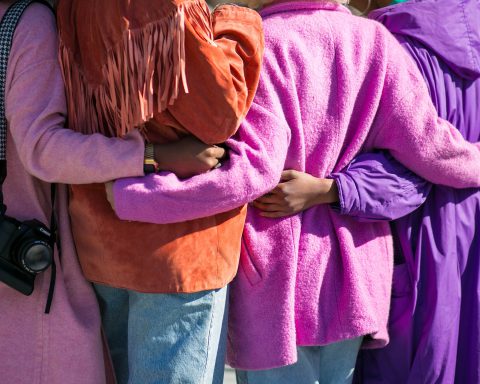Like with racism, I didn’t hear much talk about machismo growing up in Brazil. But I felt from a young age that being the “best” version of a woman was associated with being super feminine and agreeable. It’s a kind of quality some women have even in their “tomboy” phase.
Oh, and we should also be white and petite, or at least thin if tall, and preferably blonde and blue-eyed. Unless, of course, we had a nice round ass, the national pride – or our body looked like an hourglass. Then we could be darker-skinned. But that’s not the type the gentlemen would want to marry in the end, the media told us somehow.
Unless we were actually on TV. But those marriages didn’t tend to last that long.
Even our fellow woman beings put us down; sometimes they’re more cruel than the men.
Maybe what we do to each other is that kind of syndrome in which the victim becomes the perpetrator. Women are not happy with themselves, so they want to inflict the same misery on others. And/or they’ve reached a certain level in the food chain and look down and eat up the inferior little slobs, licking their chops. It can start early in life, even before puberty.

I don’t know if this came from a girl or a boy – or even a group. But when I was 11 years old, I found a heart-shaped note in my backpack. Ever the romantic, even that young, I thought it was a love note. Instead, it told me (I still remember the way the firm, clear, stark blue letters looked against the white notebook paper): “You’re too fat. No comparison between you and the other girls. Lose weight.”
I also still remember the way my throat tightened, and how the sense of being utterly unlikable deepened.
It was like a dull, chronic pain that flared up with every new rejection, which had become the norm for me.
I wasn’t thin or fair-skinned and -haired enough, and showed my likes, dislikes and tears too often. I sucked at ballet and at almost every sport. Became attached too quickly. Needed friendships too much. Was never quite right.
One day, my mother started giving me blond highlights. I gained the nickname “Old Lady,” because the highlights looked too white against my dark brown hair. When hair started growing on my legs, I gained the nickname “Congo.” There is so much wrong with these words – not the least of which is their utterance by such young mouths. I recall them more clearly than the curse words they hurled at me.
Where did the children learn this stuff? What were their parents passing down to them?
I shaved the hair off my sensitive skin and made it bleed. I decided to eat only twice a day, always the same thing, and burned most of it riding my bicycle two hours a day. Stopped eating sugar. Until I looked like a stick, and probably got my period delayed.

I always thought it was simply me. There was something wrong with me, and there always would be. I simply hadn’t been born to be popular.
The teasing continued still, after I moved to the U.S. with my family at age 13. Lacking the “traditional” good looks and femininity (and in the U.S., the right accent), I focused on trying to get the best grades, on trying to charm people. I developed a sharp sense of humor and sarcasm.
The boys who liked me, I made a point not to like back. I licked my chops stringing them along, then ignoring them. I only wanted challenges, the often unattainable.
The victim becomes the perpetrator.
There was something I became good at: writing and singing. My fellow woman beings (and some boys too) decided to bring me down. I struck back by playing the victim. Oh, those tears can work so well; I learned to use them to my advantage, to gain leverage with those who could do something for me.
With time, I grew aware of the sexism I had already been experiencing as a woman-to-be.
I began to question the environment I’d grown up in.
Why, for example, had we grown up in Brazil with our favorite children’s TV host (blonde, blue-eyed, compulsorily toned) often wearing a mini-skirt? Why were we wearing makeup and tiny outfits as young girls, and already learning to shake our booties? At the same time, we were taught to be ashamed of our sexuality.
Why did the man of the family feel like he could cheat on his wife all the time, get away with it, and then become violent when the woman did the same? Or become violent over imagined indiscretions by “his” woman?
Why was the man encouraged to spread his seed far and wide, while the woman was supposed to be a “respectable” daughter, an “honorable” young woman, and sex was not supposed to even be a topic? No, not in my house, young lady. We did not even need an American classroom to preach abstinence to us and dole out misinformation on condoms.
Then came much easier access to information on safe sex as well as statistics on sexism, thanks to the 21st century and the Internet.
Turns out ignorance is not bliss. It is bliss faked. Misery swept under the nice Persian rug. Drowned in sex or booze. Followed by guilt. Never. quite. right.
While certainly not unique to our side of the world, machismo in Brazil and the rest of Latin America is deeply ingrained and institutionalized – to the point that, as The Economist says, “domestic work is the largest source of female employment.” There are still not that many women at the top of the corporate ladder. With a career-driven mother – though with domestic workers in our home and the homes of our relatives – I’d never realized this.
Machismo, in all it forms, goes from school to the boardroom to politics.
Women have made important strides in society, but men and women alike still systematically belittle them. Though quite a few women have gotten into the high echelons of Latin American politics, they tend to be mocked and disrespected to try to take away their power and legitimacy. And herein lies part of the tragedy of ousted Brazilian President Dilma Rousseff.
Female politicians tend to be accused of displaying “male” qualities, as if genetically wired only to perform certain functions and display emotions a certain way. You see this to a certain extent also in the U.S., with women like Hillary Clinton, and in Germany with Chancellor Angela Merkel. Despite progress, sexism hasn’t been extinguished anywhere in the world.
Not to mention (but mentioning) the sexual harassment and disrespect female politicians get from their male colleagues in Germany, and attacks or complacency from other women. According to female friends of mine who are not in politics, it does also happen in the office (along with wage inequality) and during family gatherings in Germany. One German friend, a victim of sexual harassment everywhere she works, is afraid to report it, to seem disagreeable.
We must arm ourselves with information. It’s important to know it’s not our fault. And to not let them keep getting away with it.
It’s also important to start changing our behaviors – towards ourselves and our fellow woman beings. It starts with everyday steps, with learning to actually like ourselves. Then we can appreciate others, and become proper activists for gender equality.
Even with lots of off days to contend with, I gradually learn to let go, eat and drink what I want, stay away from liposuction and diets. I become round. And softer – outside and inside too. And in some ways, fiercer and more resilient.
Because I’ve found out that yes, I can still be loved (by others and myself), though I wasn’t born to be popular. Who wants to be popular, anyway, if being popular is being agreeable?
It is possible, as a woman with all kinds of “flaws” and disconcerting aspirations, to still get it “right.”


![Wine & Paint event on 9 Nov. 2024 at Felix Restaurant, Leipzig. Photo: Florian Reime (@reime.visuals] / Wine & Paint Leipzig](https://leipglo.com/wp-content/uploads/2024/12/pixelcut-export-e1733056018933-480x384.jpeg)







